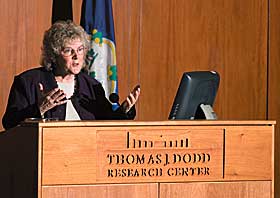  |
| HOME | THIS ISSUE | CALENDAR | GRANTS | BACK ISSUES | < BACK | NEXT > |
‘Human dignity’ ill-defined in ethical debates, says speaker by Michael Kirk - October 23, 2006 |
||||
| The phrase "human dignity," often used by both sides arguing moral, ethical, and medical issues, is often vague and ill-defined, according to internationally known bioethicist Karen Lebacqz. Speaking Oct. 18 in Konover Auditorium, Lebacqz said that the concept of human dignity "is used as a kind of trump card to foreclose argument about new technologies." Too often, those who debate issues like assisted suicide, stem cell research, and cloning use the term to explain only "what should not be, rather than what should be," Lebacqz argued. A better question, she said, is whether a scientific advance represents "the best of human efforts" or is simply "human will to power." Lebacqz's talk was the first in what is planned to be an annual Heinz and Virginia Herrmann Lecture on Human Rights and the Life Sciences. It was the inaugural event for a new program of UConn's Human Rights Institute focusing on the interaction between scientific advancement and human rights. Lebacqz, an emeritus professor of theological ethics at the Pacific School of Religion in Berkeley, Calif., cited the prime tenet of the medical profession - "do no harm" - in explaining that the risk of birth abnormalities is "enough reason" for her to reject human reproductive cloning, which she does. She spoke about the values of her own faith - she is an ordained minister in the United Church of Christ, a liberal Protestant denomination - in assessing the relationship between science and ethics, saying that an important part of her religion is looking toward the future. Some religious groups, she said, emphasize the past in making moral decisions. "Ethical guidelines can never be drawn from the past or from creation stories," she maintained, but rather from "our understanding of human destiny." Anne Hiskes, an associate professor of philosophy and director of research ethics and education for stem cell research at UConn, heads the new program on science and human rights.
She says she knew from colleagues already engaged with the Human Rights Institute that there is an interest in including the sciences - particularly the areas of bioethics and environmental ethics - in the overall human rights program. "My involvement with the University's and the state's stem cell research initiative revealed a need at all levels for humanists, scientists, and social scientists to engage in a dialogue about the ethical and social implications of scientific advances," Hiskes says. She credits former UConn professor Heinz Herrmann, and his wife, Virginia, for donating money to help establish an interdisciplinary program between the life sciences and the humanities. Heinz Herrmann was the Maude K. Irving American Cancer Society Professor of Biology in the molecular and cell biology department from 1960 to 1978. "I envision the program on science and human rights as having primarily a bioethical focus," says Hiskes. "It should enhance the reputation of the already distinguished human rights program and add an element that makes it internationally renowned and unique." Hiskes says the program will focus on three areas: human rights and the environment; human rights and the life sciences in areas such as genetics, stem cell research, nanobiology, and brain research; and human rights and public health. |
| ADVANCE HOME |

